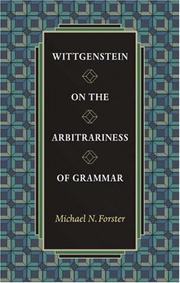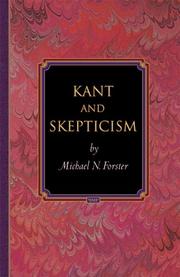| Listing 1 - 10 of 12 | << page >> |
Sort by
|
Book
ISBN: 9780199228119 0199228116 0199659389 9786612939396 0191582794 1282939394 9780191582790 9781282939394 6612939397 Year: 2010 Publisher: Oxford New York Oxford University Press
Abstract | Keywords | Export | Availability | Bookmark
 Loading...
Loading...Choose an application
- Reference Manager
- EndNote
- RefWorks (Direct export to RefWorks)
Michael Forster explores the tradition of the study of language in German philosophy. He also makes the case that the most important thinker within that tradition was J.G. Herder.
Language and languages --- Philosophy. --- Herder, Johann Gottfried, --- Philosophy --- Herder, J. G. --- Gerder, Iogann Gotfrid, --- Herder, Johann Gottfried von, --- Herder, Yohan Goṭfrid, --- Herder, J. G. von --- Von Herder, J. G. --- Herder, Giovanni Goffredo, --- הערדער, יאהן גאטטפריעד פ. --- הרדר, יוהאן גוטפריד, --- von Herder, Johann Gottfried --- Herder, Johann Gottfried
Book
ISBN: 9780226257426 Year: 1998 Publisher: Chicago University of Chicago press
Abstract | Keywords | Export | Availability | Bookmark
 Loading...
Loading...Choose an application
- Reference Manager
- EndNote
- RefWorks (Direct export to RefWorks)
Book
ISBN: 9780199604814 Year: 2011 Publisher: New York, N.Y. Oxford University Press
Abstract | Keywords | Export | Availability | Bookmark
 Loading...
Loading...Choose an application
- Reference Manager
- EndNote
- RefWorks (Direct export to RefWorks)
German language --- Language and languages --- Foreign languages --- Languages --- Anthropology --- Communication --- Ethnology --- Information theory --- Meaning (Psychology) --- Philology --- Linguistics --- Ashkenazic German language --- Hochdeutsch --- Judaeo-German language (German) --- Judendeutsch language --- Judeo-German language (German) --- Jüdisch-Deutsch language --- Jüdischdeutsch language --- Germanic languages --- Philosophy&delete& --- History --- Philosophy --- Philosophy of language

ISBN: 1282157183 9786612157189 1400826047 9781400826049 9780691113661 0691113661 0691113661 0691123918 Year: 2004 Publisher: Princeton, N.J. Princeton University Press
Abstract | Keywords | Export | Availability | Bookmark
 Loading...
Loading...Choose an application
- Reference Manager
- EndNote
- RefWorks (Direct export to RefWorks)
What is the nature of a conceptual scheme? Are there alternative conceptual schemes? If so, are some more justifiable or correct than others? The later Wittgenstein already addresses these fundamental philosophical questions under the general rubric of "grammar" and the question of its "arbitrariness"--and does so with great subtlety. This book explores Wittgenstein's views on these questions. Part I interprets his conception of grammar as a generalized (and otherwise modified) version of Kant's transcendental idealist solution to a puzzle about necessity. It also seeks to reconcile Wittgenstein's seemingly inconsistent answers to the question of whether or not grammar is arbitrary by showing that he believed grammar to be arbitrary in one sense and non-arbitrary in another. Part II focuses on an especially central and contested feature of Wittgenstein's account: a thesis of the diversity of grammars. The author discusses this thesis in connection with the nature of formal logic, the limits of language, and the conditions of semantic understanding or access. Strongly argued and cleary written, this book will appeal not only to philosophers but also to students of the human sciences, for whom Wittgenstein's work holds great relevance.
Grammar, Comparative and general. --- Comparative grammar --- Grammar --- Grammar, Philosophical --- Grammar, Universal --- Language and languages --- Philosophical grammar --- Linguistics --- Philology --- Grammar, Comparative --- Wittgenstein, Ludwig, --- Grammar, Comparative and general --- Wei-tʻe-ken-ssu-tʻan, --- Wei-tʻe-ken-ssu-tʻan, Lu-te-wei-hsi, --- Wittgenstein, L. --- Vitgenshteĭn, L., --- Wei-ken-ssu-tʻan, --- Pitʻŭgensyutʻain, --- Vitgenshteĭn, Li︠u︡dvig, --- Weitegenshitan, --- Wittgenstein, Ludovicus, --- Vitgenshtaĭn, Ludvig, --- ויטגנשטיין, לודוויג --- 维特根斯坦, --- Wittgenstein, Ludwig Josef Johann,

ISBN: 1283069539 9786613069535 1400824400 9781400824403 9780691129877 0691129878 9780691146515 0691146519 Year: 2010 Publisher: Princeton, NJ
Abstract | Keywords | Export | Availability | Bookmark
 Loading...
Loading...Choose an application
- Reference Manager
- EndNote
- RefWorks (Direct export to RefWorks)
This book puts forward a much-needed reappraisal of Immanuel Kant's conception of and response to skepticism, as set forth principally in the Critique of Pure Reason. It is widely recognized that Kant's theoretical philosophy aims to answer skepticism and reform metaphysics--Michael Forster makes the controversial argument that those aims are closely linked. He distinguishes among three types of skepticism: "veil of perception" skepticism, which concerns the external world; Humean skepticism, which concerns the existence of a priori concepts and synthetic a priori knowledge; and Pyrrhonian skepticism, which concerns the equal balance of opposing arguments. Forster overturns conventional views by showing how the first of these types was of little importance for Kant, but how the second and third held very special importance for him, namely because of their bearing on the fate of metaphysics. He argues that Kant undertook his reform of metaphysics primarily in order to render it defensible against these types of skepticism. Finally, in a critical appraisal of Kant's project, Forster argues that, despite its strengths, it ultimately fails, for reasons that carry interesting broader philosophical lessons. These reasons include inadequate self-reflection and an underestimation of the resources of Pyrrhonian skepticism.
Skepticism. --- Scepticism --- Unbelief --- Agnosticism --- Belief and doubt --- Free thought --- Kant, Immanuel, --- Kant, Immanuel --- Kant, I. --- Kānt, ʻAmmānūʼīl, --- Kant, Immanouel, --- Kant, Immanuil, --- Kʻantʻŭ, --- Kant, --- Kant, Emmanuel, --- Ḳanṭ, ʻImanuʼel, --- Kant, E., --- Kant, Emanuel, --- Cantơ, I., --- Kant, Emanuele, --- Kant, Im. --- קאנט --- קאנט, א. --- קאנט, עמנואל --- קאנט, עמנואל, --- קאנט, ע. --- קנט --- קנט, עמנואל --- קנט, עמנואל, --- كانت ، ايمانوئل --- كنت، إمانويل، --- カントイマニユエル, --- Kangde, --- 康德, --- Kanṭ, Īmānwīl, --- كانط، إيمانويل --- Kant, Manuel,
Book
Year: 1989 Publisher: Cambridge (Mass.): Harvard university press
Abstract | Keywords | Export | Availability | Bookmark
 Loading...
Loading...Choose an application
- Reference Manager
- EndNote
- RefWorks (Direct export to RefWorks)
Book
ISBN: 9780199696543 9780191756917 0199696543 Year: 2015 Volume: *25 Publisher: Oxford Oxford University Press
Abstract | Keywords | Export | Availability | Bookmark
 Loading...
Loading...Choose an application
- Reference Manager
- EndNote
- RefWorks (Direct export to RefWorks)
No period of history has been richer in philosophical discoveries than Germany during the eighteenth and nineteenth centuries. And while it was the eighteenth century that saw Germany attain maturity in the discipline (above all in the works of Immanuel Kant), it was arguably the nineteenth century that bore the greatest philosophical fruits. This Handbook provides a comprehensive introduction to the philosophy of nineteenth-century Germany that will be helpful to readers of very different sorts, all the way from laymen to undergraduates to experts. The volume is divided into four parts. The first Part explores individual philosophers, including Fichte, Hegel, Kierkegaard, and Nietzsche, amongst other great thinkers of the period. The second addresses key philosophical movements: Idealism, Romanticism, Neo-Kantianism, and Existentialism. The essays in the third Part engage with different areas of philosophy that received particular attention at this time, including philosophy of nature and of science, philosophy of mind and language, the philosophy of education, and the relationship between philosophy and science, or Wissenschaft (a German term that is famously less narrowly restricted to natural science and disciplines modeled on it than its English counterpart). Finally, the contributors turn to discuss central philosophical topics, from skepticism to materialism, from dialectics to ideas of historical and cultural Otherness, and from the reception of antiquity to atheism.
History of philosophy --- anno 1800-1899 --- Germany --- Philosophie --- Néokantisme --- Marx, Karl, --- Allemagne --- Histoire --- Philosophy, German --- E-books --- Filosofi --- Filosofie. --- Philosoph. --- Philosophie. --- Philosophy, German. --- Historia. --- 1800-1899. --- 1800-talet. --- Deutschland. --- Duitsland. --- Tyskland. --- Néokantisme. --- Marx, Karl
Book
ISBN: 9781316638170 9781107187603 9781316888582 Year: 2019 Publisher: Cambridge Cambridge University Press
Abstract | Keywords | Export | Availability | Bookmark
 Loading...
Loading...Choose an application
- Reference Manager
- EndNote
- RefWorks (Direct export to RefWorks)
Hermeneutics. --- Herméneutique --- Herméneutique. --- Herméneutique.
Book
ISBN: 3030408744 3030408736 9783030408732 9783030408749 Year: 2020 Publisher: Cham : Springer International Publishing : Imprint: Palgrave Macmillan,
Abstract | Keywords | Export | Availability | Bookmark
 Loading...
Loading...Choose an application
- Reference Manager
- EndNote
- RefWorks (Direct export to RefWorks)
This book offers a broad re-evaluation of the key ideas developed by the German Romantics concerning philosophy and literature. It focuses not only on their own work, but also on that of their fellow travelers (such as Hölderlin) and their contemporary opponents (such as Hegel), as well as on various reactions to and transpositions of their ideas in later authors, including Coleridge, Byron, Kierkegaard, Nietzsche, and Dostoevsky.
Romanticism. --- Pseudo-romanticism --- Romanticism in literature --- Aesthetics --- Fiction --- Literary movements --- Aesthetics. --- Poetry. --- German language. --- Poetry and Poetics. --- German. --- Ashkenazic German language --- Hochdeutsch --- Judaeo-German language (German) --- Judendeutsch language --- Judeo-German language (German) --- Jüdisch-Deutsch language --- Jüdischdeutsch language --- Germanic languages --- Poems --- Poetry --- Verses (Poetry) --- Literature --- Beautiful, The --- Beauty --- Esthetics --- Taste (Aesthetics) --- Philosophy --- Art --- Criticism --- Proportion --- Symmetry --- Psychology --- Romanticism --- German language --- Germany --- Radio broadcasting Aesthetics

ISBN: 9780691129877 0691129878 Year: 2008 Volume: *3 Publisher: Princeton ; Oxford Princeton University Press
Abstract | Keywords | Export | Availability | Bookmark
 Loading...
Loading...Choose an application
- Reference Manager
- EndNote
- RefWorks (Direct export to RefWorks)
Kant, Immanuel --- Skepticism. --- Kant, Immanuel, --- Skepticism --- Scepticism --- Unbelief --- Agnosticism --- Belief and doubt --- Free thought --- Kant, Emmanuel --- Kant, Emanuel --- Kant, Emanuele --- Kant, I. --- Kānt, ʻAmmānūʼīl, --- Kant, Immanouel, --- Kant, Immanuil, --- Kʻantʻŭ, --- Kant, --- Kant, Emmanuel, --- Ḳanṭ, ʻImanuʼel, --- Kant, E., --- Kant, Emanuel, --- Cantơ, I., --- Kant, Emanuele, --- Kant, Im. --- קאנט --- קאנט, א. --- קאנט, עמנואל --- קאנט, עמנואל, --- קאנט, ע. --- קנט --- קנט, עמנואל --- קנט, עמנואל, --- كانت ، ايمانوئل --- كنت، إمانويل، --- カントイマニユエル, --- Kangde, --- 康德, --- Kanṭ, Īmānwīl, --- كانط، إيمانويل --- Kant, Manuel,
| Listing 1 - 10 of 12 | << page >> |
Sort by
|

 Search
Search Feedback
Feedback About UniCat
About UniCat  Help
Help News
News